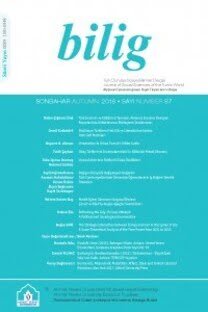Searching for Excellence in Education in Educational Communication: The Role of IQ, EQ and SQ
Değişik disiplinlerde benimsenen yeni yaklaşımların tümü, eğitimin sabit özellikler içermediğine dikkat çekmektedir. Değişimin çok önemli bir unsur olduğu bu alanda, eğitimcilerin iletişim becerilerinin önemi, özellikle vurgulanması gereken bir konudur. Eğitimin en verimli halini alabilmesi, hem eğitimcinin hem de öğrencinin iletişim becerilerini geliştirebilmeleriyle yakından ilgilidir. Etkili iletişimin gerçekleşebilmesi ise, yine her iki tarafın da bu konuyu önemsemesine ve iletişim becerilerini arttırabilmek için sorumluluk almasına dayanır. Eğitim süreci boyunca, her konuda olduğu gibi, iletişimin geliştirilmesi konusunda da eğitimcinin öğrenciye iyi örnek olması gerekmektedir. Eğitimde mükemmelliğe ulaşabilmek için geliştirilmesi gereken iletişim becerileri, ancak eğitimcinin sahip olduğu, kısaca IQ, EQ ve SQ diye adlandırılan beyinsel zeka, duygusal zeka ve ruhsal zeka türlerini birleştirerek kullanabilmesiyle yakından ilişkilidir. Bu çalışmada, IQ, EQ ve SQ zeka türleri, eğitimde iletişimin geliştirilebilmesi açısından ele alınacak, eğitimcilerin bu konuda çok daha başarılı olabilmeleri için her üç zeka türünü de etkili bir biçimde kullanabilmelerinin önemi vurgulanacaktır.
Eğitimde İletişimde Mekemmellik Arayışı: IQ, EQ, SQ Zekaları ve İşlevleri
All the new approaches in different disciplines imply that education is not a static area, and the communication skills of educators play a highly important role in this non-static process. This puts forward the fact that both educators and students have to cyltivafe themselves in the search for excellence in education. In other words, “being a master in communication” is the equal responsibility of the two parties since “effective” communication requires mutual transaction. Even though it seems to be the responsibility of both sides, the modeling role of educators seem to be much more important throughout the education process. From this perspective, achieving excellence in the education process depends on the ability and effectiveness of educators in integrating their analytical, emotional and spiritual quotient. The competence of educators in this regard are of great importance if the students are to be guided in the best way possible. This paper dwells on the search for excellence in developing the communication skills of educators. The authors intend to discuss IQ, EQ, and SQ altogether from the perspective of communication in order to point to the significant role they play in improving educators’ communication skills.
___
AÇIKGÖZ ÜN, Kamile (2003), Etkili Öğrenme ve Öğretme, İzmir: Eğitim Dünyası Yayınları.BRAIN, Marshall (2005), “What Constitutes a Person's IQ?” http://www.howstuffworks.com/question455.htm, 15.09.2005.
BUZAN, Tony (2001), The Power of Spiritual Intelligence, USA: HarperCollins.
BOZDAĞ, Muhammed (2002), Ruhsal Zeka, İstanbul: Nesil Yayınları.
CELEP, Cevat (1997), “Öğretmenlik Yeterlilik Duygusu,” Yaşadikça Egitim Dergisi, Ocak/Şubat, Istanbul (100-110).
EDWARDS, Paul (1999), The Spiritual Intelligence Handbook, USA: Emmanuel Meals.
ERGİN Akif (1998), Öğretim Teknolojisi: İletişim, 2.Baski, Ankara: Anı Yayıncılık.
GARDNER, Howard (1993), Frames of Mind: The Theory of Multiple Intelligence, NY: BasicBooks.
GOLEMAN, Daniel (1995), Emotional Intelligence; Why It Can Matter More Than IQ, NY: Bantam Books.
GOLEMAN, Daniel (2000), Working With Emotional Intelligence,. NY: Bantam Books.
GOLEMAN, Daniel, BOYATZIS, Richard E., McKEE, Annie (2002), Primal Leadership: Realizing the Power Emotional Intelligence, Boston: Harvard Business School Publishing.
GOTTFREDSON, Linda S. (1997), “Mainstream Science on Intelligence: An Editorial with 52 Signatories, History, and Bibliography,” Intelligence, 24(1), 13-23.
GRIFFIN, Em (2000), A First Look At Communication Theory, 4th Edition, Boston: McGraw-Hill.
OKAY, Ayla, OKAY, Aydemir (2001), Halkla İlişkiler: Kavram, Strateji ve Uygulamaları, İstanbul: Der Yayınları.
PEARCE, W. Barnett (1994), Interpersonal Communication: Making Social Worlds, New York: HarperCollins.
SENSIPER, Sylvia (2005), “Emotional intelligence: More important Than IQ?” http://community.healthgate.com/GetContent.asp?siteid=ucsd&docid=/healt hy/mind/1999/emotintell/index, 03.10.2005.
SILLARS, Stuart (1995), İletişim, Ankara: Özgün Matbaacılık.
STERNBERG, R. J. (1997), “The Concept of Intelligence and Its Role In Lifelong Learning and Success,” American Psychologist, 52(10), 1030-1037.
YAVUZER, Haluk (1999), Çocuk Psikolojisi, Istanbul: Remzi Kitabevi.
ZOHAR, Dana, MARSHALL, Ian. (2001), SQ: Connecting with Our Spiritual Intelligence, USA: Berrett-Koehler.
ZOHAR, Dana, MARSHALL, Ian (2004), Spiritual Capital: Wealth We Can Live By, USA: Berrett-Koehler.
ZOHAR, Dana, MARSHALL, Ian (2004), Ruhsal Zekamızla Baglantı Kurmak SQ, (cev: B. Erdemli, K. Budak), İstanbul: Meta Yayınları.
“IQ”, http://dict.die.net/iq/, 15.09.2005.
“IQ Testing”, http://www.psyonline.nl/en-iq.htm, 28. 09.2005.
“Intelligence Quotient”, http://www.arikah.net/encyclopedia/Intelligence_quotient#IQ-and-g, 06.10.2005
“Etkili Ogretmenlerin Ozellikleri”, http://www.ogretmenlik.com/makale3.htm, 12.09.2005.
- ISSN: 1301-0549
- Yayın Aralığı: Yılda 4 Sayı
- Başlangıç: 1996
- Yayıncı: Ahmet Yesevi Üniversitesi Mütevelli Heyet Başkanlığı
Sayıdaki Diğer Makaleler
Atatürk Döneminde Romanya'dan Türk Göçleri (1923-1938)
Dilbilgiselleşme Üzerine Bir İnceleme
XV-XVI. Asırlarda Akşehir Kent Merkezinin Nüfus Yapısı
Kırım Savaşı Sonrası Adana Eyaleti'ne Yapılan Nogay Göç ve İskanları (1859-1861)
Kazak Türklerinde Defin Merasimi ve Aş Verme Geleneği
Saruhan Sancağında Temettuat Tahriri
Türk Folklorunda Dış Ruh Tasarımı
